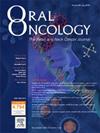喉癌 T 期和 N 期进展的分子特征
IF 4
2区 医学
Q1 DENTISTRY, ORAL SURGERY & MEDICINE
引用次数: 0
摘要
喉部鳞状细胞癌(LSCC)是一种常见的头颈部癌症,通常与人乳头状瘤病毒(HPV)感染无关。由于梗阻性症状,晚期喉癌的发病率较高,总体生存率较差。利用癌症基因组图谱(TCGA)的数据,我们分析了112例LSCC患者样本,比较了患者早期和晚期T和N样本的蛋白质组、转录组和基因组。我们观察到不同基因的SNV频率在早期和晚期组之间存在显著差异。最值得注意的是,我们观察到NOTCH1突变在晚期n期声门上癌中更为常见,也与LSCCs中较差的患者生存有关。甲基化分析还揭示了晚期N声门癌中JUN基因甲基化的变化。转录组学分析显示c-JUN, HOXB7和HOXB9转录水平的差异表达,表明这些途径可能参与了进展和淋巴结参与。我们的研究结果表明,LSCC在不同的阶段和亚位点经历了不同的分子变化。我们观察到包括NOTCH1突变在内的多个进展、转移和生存的潜在标记物,这些标记物可能在未来的研究中作为预后指标。本文章由计算机程序翻译,如有差异,请以英文原文为准。
Molecular features of T and N stage progression in laryngeal cancer
Laryngeal squamous cell cancer (LSCC) is a common type of head and neck cancer that is typically unrelated to human papilloma virus (HPV) infection. Late-stage laryngeal cancers are associated with greater morbidity due to obstructive symptoms, and poorer overall survival. Using data from The Cancer Genome Atlas (TCGA), we analyzed 112 patient LSCC samples, comparing patient proteome, transcriptome and genome between early and late T and N samples. We observed significant differences in SNV frequency for various genes between the early and late-stage groups. Most notably we observed that NOTCH1 mutation, which was more frequent in late N-stage supraglottic cancers, was also associated with poorer patient survival in LSCCs. Methylation analysis also revealed changes in JUN gene methylation in late N glottic cancers. Transcriptomic analysis revealed differential expression in c-JUN, HOXB7 and HOXB9 transcript levels, suggesting potential involvement of these pathways in progression and nodal involvement. Our findings illustrate that LSCC undergoes distinct molecular changes associated with different stages and subsites. We observed multiple potential markers for progression, metastases and survival, including NOTCH1 mutation, which may aid as prognostic indicators in future studies.
求助全文
通过发布文献求助,成功后即可免费获取论文全文。
去求助
来源期刊

Oral oncology
医学-牙科与口腔外科
CiteScore
8.70
自引率
10.40%
发文量
505
审稿时长
20 days
期刊介绍:
Oral Oncology is an international interdisciplinary journal which publishes high quality original research, clinical trials and review articles, editorials, and commentaries relating to the etiopathogenesis, epidemiology, prevention, clinical features, diagnosis, treatment and management of patients with neoplasms in the head and neck.
Oral Oncology is of interest to head and neck surgeons, radiation and medical oncologists, maxillo-facial surgeons, oto-rhino-laryngologists, plastic surgeons, pathologists, scientists, oral medical specialists, special care dentists, dental care professionals, general dental practitioners, public health physicians, palliative care physicians, nurses, radiologists, radiographers, dieticians, occupational therapists, speech and language therapists, nutritionists, clinical and health psychologists and counselors, professionals in end of life care, as well as others interested in these fields.
 求助内容:
求助内容: 应助结果提醒方式:
应助结果提醒方式:


